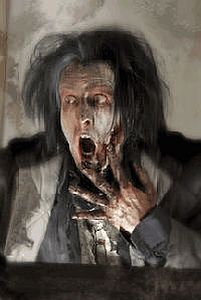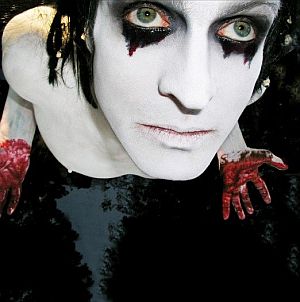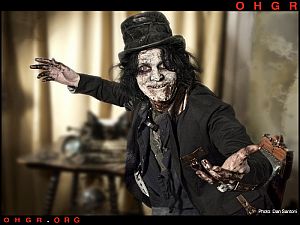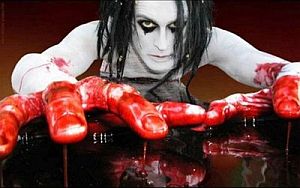 Interview with
Interview with
Nivek Ogre (ohGr)
Nivek Ogre just put out a new album this month with his latest project OHGR, is working on a film project, and has a SKINNY PUPPY release later this year. We caught up with him earlier this week for some questions.
Reflections of Darkness (RoD): You just put out a new album [‘undeveloped’] and I wanted to know do you feel like you accomplished what you wanted to with this album?
ohGr: Well, I mean you never feel, you always abandon a piece of work, you never are finished. I know it’s a cliché, but it’s a truism. In a lot of ways we abandoned it at a place where there’s a further development of that project that still will see light of day, that kind of an extension, you know, a redux, or what it was when we were recording it. There’s a bunch of stuff that wasn’t really included, along with the trip and that takes us back a little bit more to Devils in My Details. We’re doing a limited edition vinyl release that’s gonna have some interesting twists and turns to it, but I think that the album on a whole I’m really happy with how it turned out as a piece of me because it flows from beginning to end. There’s always things that you hear and you kind of go okay this could have been better or whatever, but I think, then again I really go from feedback as well too, except I think once the album is done it’s no longer mine to really even talk about. There’s definitely a satisfaction where a lot of points were touched. And kind of it starts somewhere and ends somewhere. And it also has, for me, again with lyric writing sometimes there’s always something that pops out, but in this case there’s a lot of things that pop out for me that when I was writing them I was a bit confused about, you know - what is the meaning of this? - where is this going? And certain events happened in real life after the record was turned in that kind of made them even stronger for me. It had that effect too, so it was an enjoyable experience all around.
RoD: You just mentioned a limited edition vinyl; do you have a release date for that?
ohGr: Well, an announcement’s coming out for it, so I’m being premature kind of talking about it with you a little bit. I just say to watch our website, which is: ohgr.org, ogre.com, or who do I have to fuck.org, which is, www.wdihtf.com, just the call letters from who do I have to fuck. There will be an announcement shortly about it for sure.
RoD: You released two singles [‘Collidaskope’ & ‘Tragek’] that are on this album prior to putting this album out. How long have you been working on ‘undeveloped’?
ohGr: For quite a while, actually. You know, off and on there’s a lot of stuff that kind of came in between business wise because we were given insolvency with SPV, with SKINNY PUPPY and with OHGR, really. It all tumbled upon both projects, so there’s a lot of stuff busines s wise that had to be dwelt with that was more depressing than anything. It wasn’t like we were sitting there with notebooks giving out our business plan. There’s a lot of slow communication oversees with people in a day and age that should be quick and immediate. But it never seems that way. There’s a lot of that kind of time wasted, and there’s very productive periods from within that time period from when we released ‘Tragek’. And ‘Collidaskope’ was done as an experiment we were kind of working on the website. And getting involved seeing if there’s an interaction between people. And the connection we had with that was just like - we’ll have people say this into a telephone. We have a telephone on the website where you can leave messages, an unbreakable telephone, some of the messages we just asked kids to say “welcome to Collidaskope” - “welcome to Collidaskope” and then we turned the song around within three days or so and then put it for a free download with these kids who had participated with their voices on the track. And that seemed to create a kind of an interesting connection circuit within people. So we’re looking for ways of connecting without being overt about it, or being really physically present at times. You know, you create characters and you try to find different ways of connecting with fans. And that was one of the attempts to do it. And then there was a period of time we were kind of working out all the business and then the rest of the album kind of came together pretty quickly after that. I think that it was in the space of about a year. It was like a year it took to come together.
s wise that had to be dwelt with that was more depressing than anything. It wasn’t like we were sitting there with notebooks giving out our business plan. There’s a lot of slow communication oversees with people in a day and age that should be quick and immediate. But it never seems that way. There’s a lot of that kind of time wasted, and there’s very productive periods from within that time period from when we released ‘Tragek’. And ‘Collidaskope’ was done as an experiment we were kind of working on the website. And getting involved seeing if there’s an interaction between people. And the connection we had with that was just like - we’ll have people say this into a telephone. We have a telephone on the website where you can leave messages, an unbreakable telephone, some of the messages we just asked kids to say “welcome to Collidaskope” - “welcome to Collidaskope” and then we turned the song around within three days or so and then put it for a free download with these kids who had participated with their voices on the track. And that seemed to create a kind of an interesting connection circuit within people. So we’re looking for ways of connecting without being overt about it, or being really physically present at times. You know, you create characters and you try to find different ways of connecting with fans. And that was one of the attempts to do it. And then there was a period of time we were kind of working out all the business and then the rest of the album kind of came together pretty quickly after that. I think that it was in the space of about a year. It was like a year it took to come together.
RoD: Have you noticed a difference in the audience now than when you first started making music?
ohGr: Yeah, of course I mean I always kind of go by the ruler that a musical lifetime is seven years. But you know someone kind of ventures into really being infatuated with music you know in their teens and it goes to when their about twenty, twenty-one, twenty-two and sometimes it goes farther, but generally a generation of music is seven years. So I put that in terms of OHGR, and we started in 2000, and in 2001 we released our second record. Then, seven years went by until we released our third record, so that was almost a musical generation, so yeah. I mean kids have totally changed; obviously the way that we release music has changed. I go back to the early days of vinyl and cassette tapes, so I mean times have changed, and also just in a sense of that whole wave of music, that whole industrial wave of music has kind of gone by and is now part the hybridized pool of pop rock music. Its peak was kind of back in the mid nineties kind of hybridized into metal. So we never really made that peak or that jump to arena shows. We’ve always stayed within a cult following. We’ve always had, generally speaking, the same size audiences. You know smaller here, bigger there at different times, you know, depending where you’re at in your career. It’s always been a cult following for us. It’s always nice to see that for us there’s a mixture of young kids and there’s older people coming up to the shows. And the weird thing is that it was always like that. Even in early SKINNY PUPPY shows I was shocked that there were these guys that were really into PINK FLOYD [laughs] that were totally out there just grooving to SKINNY PUPPY. I couldn’t figure it out, but we are kind of psychedelic, so yeah, I got it. So hopefully we can keep appealing to that. It’s all win-win, but you know the music business has changed fundamentally, on so many levels.
RoD: It definitely has. What inspires you to keep making music?
ohGr: Well one short answer is it’s the only thing I can do. It’s the only thing I’ve trained myself to do really. And I really don’t know what my other options are at this point. I made a very determined decision when I was young that if I’m gonna jump off this cliff, I’m gonna jump off this cliff - and I did. And so it’s really hard for me to think of going back to becoming a security officer somewhere or some warehouse guy or I don’t know what I’ll become after this. It’s always been just a bohemian life of following your instincts and going from project to project and waiting to see what’s around the corner. But that’s the [most fun] part of it, I mean once you get over the horrible anxiety of ‘I’m not collecting a check every week’ and that went away years and years ago. I think the first ten years I was like, how does this work? you know, I make money every six months - maybe - how do I make this work? And then in my thirties going through the this is gonna end at forty, how am I gonna make this work? And still, you know it’s still kind of coping along. Again it hasn’t been gangbusters. You know, I don’t have the big house in Malibu but I do live outside of Malibu in the mountains, but in a small guest house on a five acre property that’s really secluded. And it’s like having my own house. So, I found a unique place to live that’s absolutely beautiful. But it’s not, I didn’t ride that big wave at all or anything and I’ve always lived like a bohemian. I don’t have a lot of overhead in my life and so that the ebbs and flows of this business haven’t really affected me. I probably went a little off topic on that I apologize.
RoD: Oh no, no - it’s all interesting. Will there be a tour?
ohGr: Yeah we’re looking at touring in August right now. It all comes down to again that ohGr is a bit more of a baby band compared to SKINNY PUPPY. And then there’s the economy of means that comes into play, so I mean we’re looking at obviously gas prices are lowering a bit now which is really good, but we’re looking at just averaging out everything, got all the offers coming in, and looking at offers and just making sure we can do it. But it seems like everybody wants to do it. When I first heard about it, I was like well, it doesn’t look like anybody’s going to want to do it, within our crew, and our artist people, musicians and our visual guy Tim Hill. But then everyone was like, no, I really want to do it. I’m kind of stuck with moving to the truth on that one, which I’m really excited about. Honestly I love touring SKINNY PUPPY, it’s a lot harder because there’s a lot more involved in it. And you’re doing things you’ve done for twenty-six years. But OHGR’s a real joy for me because it’s just a lot of new music that I haven’t performed a lot and the band’s really fun to tour with, we’re all family.
 RoD: Speaking of SKINNY PUPPY, will there be a release this year?
RoD: Speaking of SKINNY PUPPY, will there be a release this year?
ohGr: Yes there will be actually the fourth quarter of 2011 is what I predict. My final prediction from the swami head is in fourth quarter of 2011 there will appear a SKINNY PUPPY disc, it’s titled ‘HanDover’. And it’s been turned over to them, so they have all the masters, they have the artwork, they have everything, so it’s just a matter of bringing to the system.
RoD: Is there anything else you’re working on right now?
ohGr: I have a little film thing I’m doing at the end of this month, but I can’t really say what it is. I told one person, but the actual contract hasn’t come through, it’s coming through this week. So I can’t really say anything about it, I don’t want to jinx it, but I’m pretty sure that’s happening. It’s for a kind of a cool anthology horror film. Like a joint, I think it’s a joint US and European production. Are you familiar with many horror films? Are you a big horror fan?
RoD: Yes, I am.
ohGr: Okay, do you remember that movie ‘Hardware’ in the eighties?
RoD: Yeah.
ohGr: So yeah - it’s [Richard] Stanley doing one of the segments and either Savini or Merrill’s doing one of them. And then a number of other film makers are. So, it’s six segments, it’s all based on the Grand Guignol, I don’t know if you’re familiar with that but it’s a period of French theatre. It started in a theatre called Guignol, and it’s basically loosely based stories and plotlines that were revolved around gore effects. And people got really into it in the late eighteenth century, or nineteenth century, I think it was. The late ninetieth century and it became quite a thing like the Italian horror, the gorier the better, so these stories are based on loosely the director’s interpretations of the Grand Guignol. And I’m kind of doing a part that’s a wrap around story, between all the parts, like the crypt keeper in ‘Tales From the Crypt’, I’m that sort of a character, that kind of wraps all the stories together. So I’m excited about doing that. Those kind of things are the one perk that I’ve gotten out of this, I guess from living down here and being available, and doing Repo kind of opened me up to a few of these things. And they’re a lot of fun to do. I can’t tell you how much fun Repo was to do. It’s probably one of the top five experiences of my life. You know, just doing something, what an amazing experience. And I love working on film and I love working under makeup so any chance I can go I’ll do that. And it pays good too.
RoD: Yeah. It’s good to fill in, in between music and stuff too.
ohGr: It is. So that’s getting tougher and tougher and it is a good thing to just kind of, you know acquiesce all of the other forms of income together and it just creates things a little more stable because there were a few years where it was tight and lean, where things really changed with downloading. But then it’s like wow, how do you make this work?
RoD: Yeah. I think in a way you kind of have to embrace what is changing and then try to change how you’re doing it.
ohGr: Absolutely, we started that. I always started when I was younger; I mean I was an introvert when I was younger and shy. I always wanted to be a musician who’s in the background, who’s a mysterious character, you don’t really know much about me. And I spent most of my career in SKINNY PUPPY covered in mud, blood, and no one really knew who I was and I think that was a great strength, I mean I thought it was a great strength but it had more to do with my own insecurities, but I think since then I’ve got, I mean I’ve stepped through that paper wall. And you know, with all of these things. I never wanted to embrace social media and all this stuff, but I found a way of doing it, it was through creating characters that sort of take over for me. So I don’t have to personally do it, but I can monitor over it all, because I never really wanted to, I don’t want that much known about me personally, necessarily. You know what I mean? I think that great art or art itself stands alone from the art itself and it should. Some of my favourite artists, I know very little about. There’s this book Maldoror [Les Chants de Maldoror] written by a guy named Isidore Ducasse that was written in the sixteenth century, and he chose the pen name Lautréamont who wrote this book that’s considered the bible of surrealists. It was embraced as a surrealist bible by the early surrealists. And there’s still little known about the guy who wrote the book that just adds to the mystery of the book itself. I’ve always embraced that, but you have to embrace these, everybody wants to know everything about you now, with the social media, but there’s a way of getting around it. And I’ve kind of found a way by creating characters, like Mr. Brownstone and things like that. [laughs] But, he’s real, I swear. He’s real.
RoD: Do you get a different sort of enjoyment out of the acting compared to the music?
ohGr: Yeah, [there are] two different disciplines involved in acting. You’re servicing a production. So it takes a huge amount of weight off of your own responsibilities in creating the production, and then servicing the production. Within acting there’s a lot tighter parameters in a way over what you’re doing. You’re blocking, you have a certain place you have to be and go, and that’s what you do, and within that, that’s your creative space. You make the most of it. I find that trying to fill that space and connect it in different scenes. That’s fascinating to me. Because doing that is a lot harder than it looks. And then the other thing is just that you’re working in a place where you’re staying, you’re not travelling. And you know, I travelled for twenty-six years on tour, and I love doing that too, but it’s really hard, it’s hard on you. So those are the three differences. The advantage to music obviously is that you’re performing in front of a live audience so you’re getting that immediate feedback. And you’re getting an incredible feedback that a lot of actors on movie sets never get, and that is the reason a lot of actors on movie sets want to go and do theatre or do music even, is because you’re getting that immediate charge and the immediate kickback.
And that’s the only downside about film you don’t really experience that. It’s your internal kind of love for what you’re doing you get out of that. So I like both mediums. And I think in a way I’ve been lucky now to experience both sides of it. And I see what the differences are and I see what the similarities are. The other difference is obviously is onstage you act big and the hardest thing for me is when I started working on a set, and lucky it was behind the mask of Pavi, so it gave me the right to emote big, but you have to emote big through a mask, but it was definitely having to bring it down to what the camera picks up, which is everything, all the little subtleties. You can really overmug, you can overdo things quite easily. I found out when I did 2001 Maniacs, I found myself mugging a lot. And I saw the takes, and thought, oh god, pull it back a bit. Like it’s just wow, hopping over everything else, so and I don’t want to overshadow anybody. I’m not that kind of, I see that a lot in acting, with people that are insecure and want to get their face out there, they’ll try and, it’s a weird business, it’s a strange business, you know, on set they’ll try and you know in some ways try to steal the scene from the actor that the camera is supposed to be focused on through some little movement. There’s all sorts of little tricks, but that’s not really what I’m into with it at all. You know, I’m into servicing the part, servicing the production and servicing the actors that are the lead actors. I really enjoy that part of it; you know being a supporting cast member.
 RoD: What music outside your genre is influential to you or do you listen to recreationally? What is the least likely thing people would expect that you listen to?
RoD: What music outside your genre is influential to you or do you listen to recreationally? What is the least likely thing people would expect that you listen to?
ohGr: The least likely thing? Hmm… probably something like Patsy Kline, I mean things like that. I like a lot of R & B and I like a lot of Motown. There’s those things I’m sure people wouldn’t think I’m listening to, but I’m listening to things more technically now, like ‘how did they get that feeling?’ There’s aspects to that I like, you know, a lot of oldies music I like, you know a lot of standards I’m starting to like, and some certain classical music, like Maskovsky and Night on Bald Mountain. Um, there’s somebody else I can’t remember his name, it starts with a P. He did the 2001 Space Odyssey, the chorale stuff for the monolith. I can’t remember what his name is he’s a Polish composer and the things with that the distance like that, I mean I’ll always love Veno, it’s a given. One of my favourite bands that haven’t done anything in a long time is Boards of Canada, which I miss.
RoD: Is there any advice you’d like to offer kids who are just starting out with music? - maybe something you wish you would have known then?
ohGr: I guess the number of cliché things and the one thing I want to say to any kid starting out in music is that I don’t envy them. Feel proud if you are reaching, I mean it’s hard to get your music out there. I want them to know with Skinny Puppy for example if we started in this environment we wouldn’t exist today. So I understand the complexities. But I also want to say that to kids out there, that the important thing is to stay to your voice. Don’t try to write music that you think people want to hear. That’s a huge trap, and your career will end up being very short. And the biggest thing I can say that I personally experienced is I never really enjoyed the moments I should have. And I did, I do honour them, and I enjoy them now. Some of the peak periods of our career I thought we were still in the building phase, and I should have just realized that every moment of this building phase is the experience; the process of the product. And although those words are in my head I never understood it. I thought I think that I was too involved in the inertia of my own life and how I needed to be perceived that I didn’t see how I was actually perceived. I missed that bit of inspiration, that bit of pat on the back would have got me through a lot of stuff, I mean my own pat on the back got me through a lot of stuff that I needed to put myself through. And the last thing is that at a certain point in your life, when you’re feeling like the world is about to end, I just want to reach out to anybody, and not just music fans but anybody, that things get better. It’s that cliché again, that when you age that certain aspects of your personality, those twisted cutting bits of insecurities of your personality they’ll start to fall away and diminish and it’s an amazing thing. It truly is an amazing thing. This comes from someone who was extremely insecure and self conscious his whole life. That’s one thing I’d like to impart if I can impart upon anything, is just that it gets better.
RoD: Yeah, I think that’s a very important message. And also, what you were talking about with perception of yourself, I think a lot of people have this idea about who they want to be, instead of embracing who they are and accepting themselves. And I think it’s really important in art, even in life.
ohGr: It’s even more important in life, art imitates life sometimes. I had an experience in the eighties because I was always someone that played around with a dark character, but underneath it, I’m the guy that escorts flies out of the house and I’ve always been that way. It’s been an interesting push and pull for me personally. And I took my art to a place, you know not quite GG Allin, but I started doing things because I thought I had to continually ramp up the danger level in what I was doing. My interpretation of that was that if you create it onstage, the idea of a car crash, people would, some people would want the car crash, but most people would be like, I hope it doesn’t happen, and I hope he’s okay. And that for me was instilling the positive people, then they’d always be looking for something dark, they’d have this wow that was weird, I usually love this stuff, but now this person is going to hurt himself and I don’t want him to. And I was doing this thing with an ice pick, I was stabbing myself with an ice pick and it got continually worse as the tour went on. It was like I got [more numb and more numb]. And in Saint Petersburg, in Florida I stabbed it into my arm so deep that it, it just stuck there and it scared me, and people saw in the front row that I was scared. I didn’t know if I pulled it out, if I hit an artery. So I finished the rest of the song and went off stage. And everything was okay. But I got called in my hotel room, which had never happened before. But these kids found my hotel room and called me and they said, “you don’t have to do that for us anymore.” I still get chills to this day when I say it, but it changed me forevermore and I realized that, yeah I was kind of veering off about what you were saying about the person I thought I should be opposed to the person I was. So that was the kind move back for me of balancing the two persons I guess.
RoD: Yeah, I think that it kind of takes a while to get to a place where you can just accept that you can just be sincere and people will accept you, for what you’re doing.
ohGr: And you know it’s having strength and conviction in your beliefs too. That only comes after experience, you know.
 RoD: Yeah, when you can start trusting yourself.
RoD: Yeah, when you can start trusting yourself.
ohGr: And hard knocks. [laughs]
RoD: Yeah, exactly [laughs] and you finally realize that all this stuff that you’ve been fixating on doesn’t really matter. You know, been through enough stuff.
ohGr: It really doesn’t because what you’re doing is your playing an old tape. The mind’s an amazing thing. What it loves to do is play an old tape playing in your mind and have you scramble for reasons why that tape is true.
RoD: Yeah, I was actually talking to someone a couple days ago about how a lot of kids, this kind of goes back to what you were talking about earlier about things changing, but a lot of kids they grow up and all they’re thinking about when they’re referring to their childhood is like, god this is so dark and horrible, but there’s all these fragments of really good memories that have been totally overshadowed by all this bad stuff that they, you know ‘I had a crappy childhood, I had a bad childhood’ and you don’t get to embrace those good memories just like, as fully, you know?
ohGr: Right, but at the same time I’ll defend childhood, I mean what a minefield it must be for kids. I think about kids now growing up and they have to have a cell phone they have to have a certain kind of jeans. And that’s not even worrying about their entertainment, there’s a certain level of things they have to deal with anyway. And I understand the process of having to go through that I just wish more kids wouldn’t carry that into the future. And I think that I was lucky enough to at a certain point, I had to just… I was forced to drop it all I would have died I guess. I had the realization that I can’t carry this forward with me anymore. I think a lot of the kids carry forward a lot of those things that they secretly go through as they’re developing as if those things will continue on the rest of their life. The analogy I use is that I had a back injury when I was seventeen, a football injury. I had somebody land on my head and I almost broke my neck.
And in my twenties and thirties, and right after the injury I was told by the doctor that I had a CAT scan because I had a calcium deposit from the bone healing that was going either against the nerve stem, it was a given a 50/50 chance that if it would go against the nerve stem I’d be a quadriplegic or it worked the other way. So I went in for the CAT scan and it was going the other way, but the doctor told me in my forties I may be on a cane, or I was gonna have problems, serious problems. So I lived my whole life, even in my twenties and thirties where I was healing in a lot of pain, because I was in a lot of pain, I was having muscle spasms through Skinny Puppy too, I was going, ‘if this is gonna be like in my forties’ so I was conditioning myself through all that time for what it was gonna be like. But, as it turned out I started doing yoga and it took different steps, as it turned out, my back is probably in better shape that it’s ever been, which is weird. Again, I guess I’m trying to draw a parallel if you continually repeat the cycles that you experience, and especially when you’re young it’s hard not to, the hardest thing is to break those cycles. Those thought patterns, you know. And just allow what is now to be, as opposed to playing that film over and over again from the past looking for reasons why it’s still in your head because those films will be in your head for the rest of your life.
RoD: Yeah, and it stops a lot of people from being able to be in the present. You know, you’re in the past or you’re constantly worried about the future. I have to fix this, I mean, you know that there’s a problem, but it prevents people from embracing what’s going on right now.
ohGr: There’s a great joke that if you have one foot in yesterday and one foot in tomorrow, you shit all over today.
‘Undeveloped’ is available on Metropolis Records (http://www.metropolis-records.com/artist/ohgr) and on SPV






Comments powered by CComment